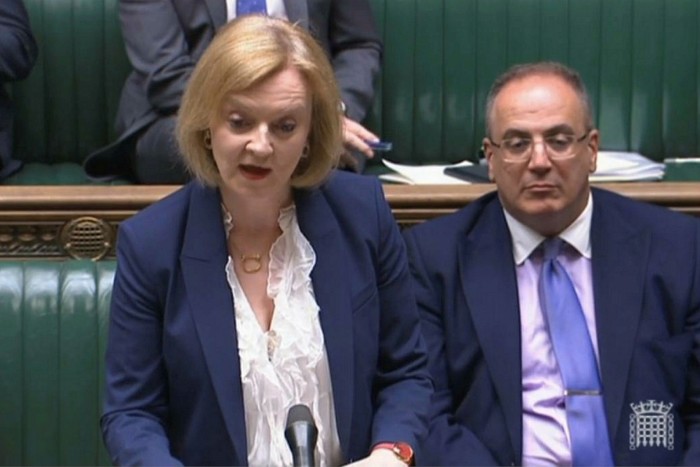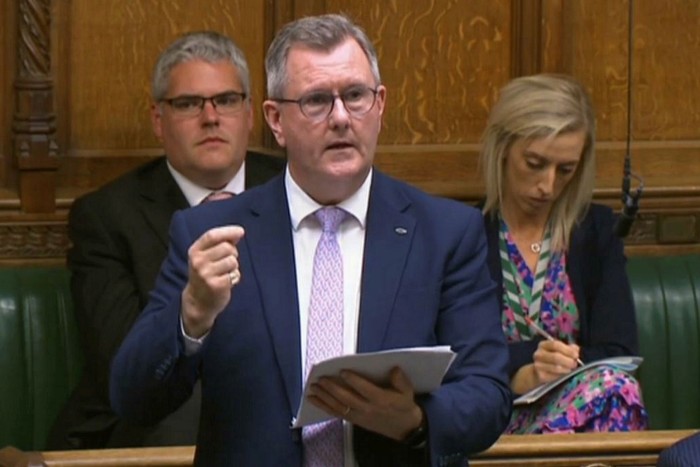Theresa May, the former UK prime minister, has led opposition to Boris Johnson’s plan to rip up the Northern Ireland element of his Brexit deal, condemning it as illegal and warning it would damage Britain’s standing in the world.
Speaking in the House of Commons on Monday, May scorned Johnson’s claim that he needed to pass legislation to overturn parts of the Northern Ireland protocol, the part of his Brexit agreement with the EU covering trade with the region.
May said she could not support the legislation, which is expected to survive its initial passage through the Commons before hitting a serious blockage in the House of Lords.
“This bill, in my view, is not legal under international law, won’t achieve its aims and diminishes the standing of the UK in the eyes of the world,” May told MPs.
Meanwhile Simon Hoare, Tory chair of the Commons Northern Ireland committee, said the bill appeared to be a “muscle flex for a future leadership bid” by Liz Truss, the foreign secretary. Andrew Mitchell, former Tory chief whip, said the bill “trashes our international reputation”.
Truss, presenting the Northern Ireland protocol bill for its second reading in the Commons, insisted the legislation was “both legal and necessary” to address economic and political tensions in the region.

She claimed the EU was unwilling to change the protocol, agreed by Johnson in 2020, even though its operation was causing tension in the pro-UK unionist community in Northern Ireland.
The protocol creates a border in the Irish Sea for goods passing from the UK into Northern Ireland, which remains in the EU’s single market for goods. It also removes the need for border checks on the Irish land border.
May, who tried and failed to sell her own Brexit deal to parliament, warned at the time that creating a trade border inside the UK would result in such tensions. Johnson later hailed his deal with the EU as a triumph.
Ministers agreed this month that the bill should not be given its second reading until Northern Ireland’s Democratic Unionist party, the biggest unionist party, had agreed to end its boycott of the region’s executive at Stormont.
But Truss admitted that she had not secured an agreement and said only that her expectation was that “the passage of the bill” would see a re-establishment of the power-sharing body at Stormont.
The DUP said it wants to see concrete action towards removing key elements of the protocol before it will bow to any UK government demands to restart the region’s executive.

On Monday, ahead of MPs voting on the legislation, DUP leader Sir Jeffrey Donaldson hinted the party might move before the bill was finally enacted, but remained non-committal, saying only that it would “consider what steps we can take”.
He added: “I have made clear that we will be condition-led, not calendar-led, and that we want to see real progress with this bill, and that’s our message today to the House of Commons.”
The EU has warned Britain against unilaterally ripping up the protocol but negotiations on improving its operation have stalled.
May noted drily that this might be because EU leaders did not expect Johnson to be in Number 10 much longer or — even if he survived as prime minister — doubted whether he would honour any future deal.
Brussels has responded to the bill by restarting legal proceedings against the UK and threatening to use “all measures at its disposal”, including a potential trade war, if London acted to unravel the protocol.
Simon Coveney, the Irish foreign minister said he was “hugely disappointed” by the British decision to push on with the legislation.
Earlier on Monday, Truss hosted UK business leaders for a roundtable summit to discuss how issues raised by the protocol could be solved.
One person present said Truss had told the meeting that EU inflexibility had left the government with no choice but to act unilaterally. They added that some UK retailers and small businesses had raised concerns that the legislation could cause a trade war with the EU during the cost of living crisis.

